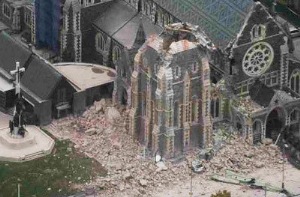 Japan’s huge earthquake, the largest in its history at 9.0 on the Richter scale, is the latest in a string of quakes that have recently rattled Haiti and New Zealand.
Japan’s huge earthquake, the largest in its history at 9.0 on the Richter scale, is the latest in a string of quakes that have recently rattled Haiti and New Zealand.
New Zealand is a spectacular, modern place that I visit as much as I can. Reporting on the New Zealand quake now is a bit like reporting on a bar fight in the middle of a world war given the horrific events in Japan. The physical scale of destruction relative to the country’s size is significant even though the death toll, tragic as always, is disproportionately smaller.
This island country in the south-western Pacific Ocean is geographically isolated, situated about 2,000 kilometres (1,200 mi) southeast of Australia across the Tasman Sea. The country’s sharp mountain peaks owe much to the earthquakes and volcanic activity caused by the clashing Pacific and Indo-Australian tectonic plates. The two plates intersect corkscrew-like between the bottom of the north and top of the south islands that make up the country.
I arrived in Auckland, New Zealand’s largest city a few days after the country’s second largest city, Christchurch, had been devastated by an earthquake measuring 6.3 on the Richter scale. This quake, on February 22nd, was deadlier than the magnitude 7.1 quake that hit Christchurch last September. Although smaller, this latest one was centred only 10 km from the city’s centre and 5 km below the surface.
Aftershocks have continued and many have left the city with its severely damaged services and properties. As of last week, 75,000 residents have left Christchurch, a city which 370,000 residents called home before the February 22nd disaster, equivalent to 150,000 residents leaving Winnipeg after some natural disaster.
Damage estimates in the Christchurch area are around $11 billion ($NZ 15 billion), around eight per cent of New Zealand’s GDP. In one sense the level of fatalities, while still expected to hit 200, has been remarkably low considering the scale of destruction. However, statistics are no consolation for those who have lost homes, livelihoods, and loved ones.
There is no way to minimize the suffering, the loss of life, or the setbacks experienced by the people of Christchurch. However New Zealanders, like western Canadians, have a pioneering culture. They are descendants of Maori (the indigenous people) and European (mainly British) settlers who have built a life in what was initially a foreboding environment far from home. With this in mind, the way that New Zealanders have dealt with the tragedy is worthy of tribute.
Government responses at the local and national level (New Zealand does not have provinces) have also been exemplary. A little more than a week after the quake 81% of water service and 95% of power service had been restored. Work crews had also removed 266,000 tons of silt, pushed up in the quake’s violent noon hour upheaval of the tectonic plate below the gravel plain the city sits on. However it will be the long term policy response that matters to the city’s future, and so far it looks encouraging.
There is no naïve chatter about all the jobs the rebuild will create, New Zealanders know they have taken a hit. There is little talk of new taxes or a so-called Queensland flood levy as imposed by Australia to fund repairs there. Rather, the consensus is emerging around not increasing spending and reprioritizing existing budgets. The political parties quietly understand that government spending; particularly transfer program spending, increased far faster than the NZ economy grew during the last decade as and international dairy industry boom flooded New Zealand coffers.
The Earthquake, meanwhile, is going to lead to a massive surge in capital spending so expect the following to unfold. First there will be debate on how to cut entitlement programs particularly middle class welfare and adjusting pension programs to raise the retirement age. Marginal capital spending projects will be postponed or ended. For example, plans for urban rail in Auckland, a poor use of resources, have been cancelled. Finally, the government has announced it will rebalance the country’s balance sheet. It will start by partially privatizing several crown corporations to raise funds for rebuilding Christchurch.
The Christchurch earthquake is a disaster, but disasters bring out character. In the public and private sphere there is every sign that New Zealand’s private and political character will see it turn crisis into opportunity.
 Japan’s huge earthquake, the largest in its history at 9.0 on the Richter scale, is the latest in a string of quakes that have recently rattled Haiti and New Zealand.
Japan’s huge earthquake, the largest in its history at 9.0 on the Richter scale, is the latest in a string of quakes that have recently rattled Haiti and New Zealand. Japan’s huge earthquake, the largest in its history at 9.0 on the Richter scale, is the latest in a string of quakes that have recently rattled Haiti and New Zealand.
Japan’s huge earthquake, the largest in its history at 9.0 on the Richter scale, is the latest in a string of quakes that have recently rattled Haiti and New Zealand.